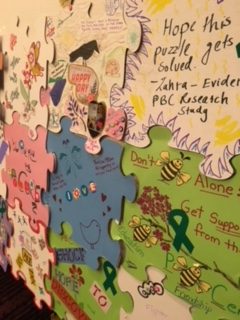
PBC Patient Conference 2018 – Report
The Biennial PBCers Patient Conference was held May 17-19 this year in Houston, Texas. The conference brought together over 100 PBC patients from across the USA to focus on:
- diagnosis and treatment
- symptom management
- research
- clinical trials and imaging tools
- time for patients to meet and share experiences
I had the privilege of attending the conference on behalf of Canadian PBC patients, and these are some of the highlights that I took away from the many excellent presentations and discussions.
DIAGNOSIS AND TREATMENT
Dr. Robert Gish kicked off the conference with his presentation “Management of Liver Disease & Other Complications”, emphasizing the importance of looking at the whole patient, including managing symptoms and quality of life in addition to managing the disease. Dr. Gish provided valuable insights into itch, fatigue, oral and vision health. He gave favorable mention to coffee, some statins, vitamins and regular exercise as beneficial to those with PBC. He also recommended that PBC patients be screened for celiac sensitivity as 7% of PBC patients are affected.
Dr. Chris Bowlus, spoke via video, sharing his philosophy of care, “listen to the patient”. He spoke about PBC diagnosis, treatment and referenced many studies regarding PBC outcomes. He shared a link to the Global PBC Score, where patients can assess their risk factors for disease progression. https://www.globalpbc.com/globe
Dr. Kidist Yimam gave a talk on “Autoimmune Liver Disease & Associated Diseases”. She focused on the importance of the recognizing the potential risk factors for 1st degree relatives of those with PBC and screening for AMA positivity.
SYMPTOM MANAGEMENT
Dr. Jennifer Pate focused her talk on fatigue and its relationship to depression and anxiety – including symptoms and sources, obstacles to diagnosis, associated medical conditions, drugs that may cause depression, treatment consisting of behavioral strategies and medication. She stressed the importance of having a sense of purpose. Dr. Pate was diagnosed with PBC, giving her a unique perspective.
Dr. Marlyn Mayo gave a comprehensive talk on how we measure, treat and lessen the impact of PBC itch.
RESEARCH
Dr. Eric Gershwin gave us a tour via video of his lab at UC Davis, where research involves working with mouse models to predict who will get PBC, with the hope of being able to use biomarkers for early detection and individualized treatment.
Dr. John Vierling provided a comprehensive description of “Overlap Syndrome” where patients have both PBC and AIH. Between 1 and 10% of those with PBC have overlap syndrome.
PBCers Patient Survey was recently completed online. You can find the results using this link: https://www.surveymonkey.com/results/SM-F8TF8WS9L/
CLINICAL TRIALS AND IMAGING TOOLS
John Campbell, PhD gave an overview of the drug development process, highlighting the importance of patient participation in clinical trials.
Dr. Paul Boudes of Cymabay Pharma presented the Phase 2 results of Seladelpar a drug for PBC. Canadian sites for the trial include Toronto and Calgary
Dr. Preston Klassen of Arena Pharma presented early results of Etrasimod for PBC. There are no Canadian sites for this trial.
Dr. Sudhakar Venkatesh from the Mayo Clinic presented evidence on the efficacy of Magnetic Resonance Enterography (MRE) imaging for liver disease. I believe we have one MRE machine in Canada at the Toronto General Hospital.
Dr. Phillipe Wiesel of Genkyotek Pharma presented GKT831 a new clinical trial currently recruiting patients. Interim results are expected in the Fall of 2018. Canadian sites for this trial include Calgary, Winnipeg and Montreal.
Richard Kim and Dr. Cynthia Feng from Intercept Pharma presented “Our Partnership with the PBC Community – Past, Present & Future”.
CONCLUSION
It was wonderful to see so many PBC patients coming together to meet, talk, learn and share. And it was a real privilege for me to have an opportunity to join them. I learned a great deal about how other PBC patients are currently managing their disease. I was also heartened to learn more about the many focused efforts that are being devoted to better diagnosis, treatment and management of PBC by so many dedicated physicians, clinicians and researchers. My personal thanks to Carol Roberts, Cathy Mumford and Linie Moore from the PBCers Organization for welcoming me to the conference and for providing such a rich and informative agenda in a relaxed and inclusive environment.
